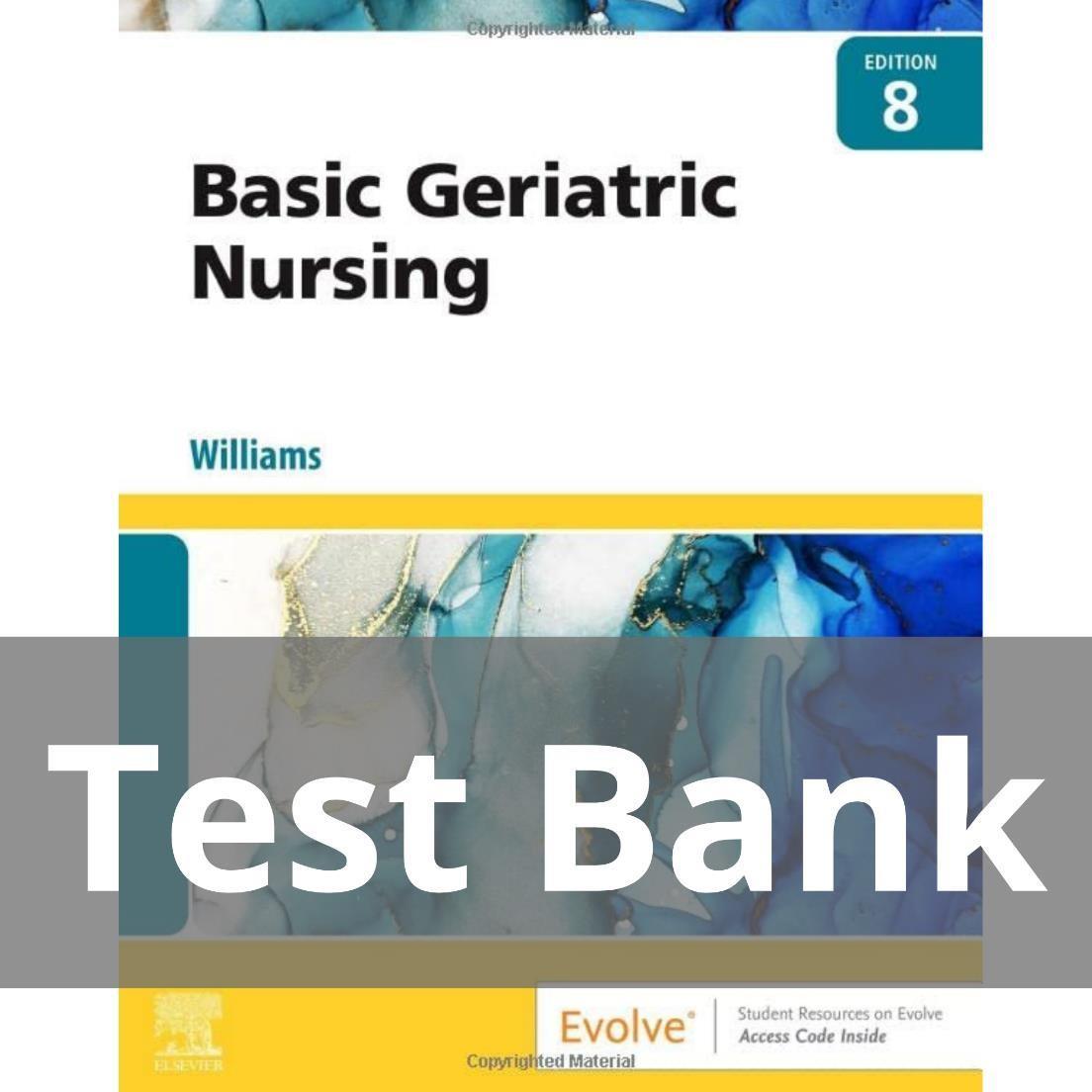

Chapter 01: Trends and Issues Williams: Basic Geriatric Nursing 8th Edition
MULTIPLE CHOICE
1. Which fact explains the shift of health care focus toward the older adult in the late 1960s?
a. Disabilitywas viewed as unavoidable.
b. Complications fromdisease increased mortality.
c. Older adults’ needs are similar to those ofall adults.
d. Preventive healthcare practices increased longevity.
ANS: D
Increased preventive health care practices, disease control, and focus on wellness helped people live longer.
PTS: 1 DIF: 4
REF: p. 2 OBJ: 2
TOP: Aging Trends KEY: Nursing Process Step: Data Collection
MSC: NCLEX: Health Promotion and Maintenance: Growth and Development
NOT: Understanding
2. To which age group does the term “aged” apply?
a. 55–64 years of age
b. 65–74 years of age
c. 75–84 years of age
d. 85 and older
ANS: C
The term aged refers to persons who are 75–84 years ofage.
PTS: 1
DIF: 1 REF: p. 2 | Table 1.1
OBJ: 1 TOP: Age Categories
KEY: NursingProcess Step: Data Collection
MSC: NCLEX: Health Promotion and Maintenance: Growth and Development
NOT: Remembering
3. Which is trueof ageism?
a. It is discrimination against persons solelyon the basis ofage.
b. It causes a personto fear aging.
Download All Chapters Here:
https://nursingrade.com/product/basic-geriatric-nursing-8th-edition-by-patricia-awilliams-test-bank/
c. It involves the use ofculturalsensitivityto address concerns of aging.
d. It focuses on resources for the older adult.
ANS: A
Ageism is a negative belief pattern that influences persons to discriminate against persons solely on the basis of age and can lead to destructive behaviors toward the older adult.
PTS: 1 DIF: 4 REF: p. 4 OBJ: 3
TOP: Ageism KEY: Nursing Process Step: Data Collection
MSC: NCLEX: Psychosocial Integrity: Psychosocial Adaptation
NOT: Understanding
4. Which legislation has been the most beneficial legislation that has influenced health care for the older adult?
a. Medicare and Medicaid
b. Elimination ofthe mandatoryretirement age
c. The Americans with Disabilities Act
d. The Drug Benefit Program
ANS: A
The broadest sweeping legislation beneficial to the older adult is Medicare and Medicaid. The elimination of the mandatory retirement age does not apply to health care. The Americans with Disabilities Act deals with all Americans with disabilities, not just the older adult. The Drug Benefit Program was added to Medicare, but deals only with medications.
PTS: 1 DIF: 4 REF: p. 11 OBJ: 6
TOP: Legislation KEY: Nursing Process Step: Implementation
MSC: NCLEX: N/A NOT: Understanding
5. Which housing option for the older adult offers the privacy of an apartment with restaurant-style meals and some medical and personal care services?
a. Government-subsidized housing
b. Long-termcare facility
c. Assisted-living center
d. Group housing plan
ANS: C
Assisted-living arrangements offer the privacy ofan apartment or condominiumwith meals prepared and served, limited medical care, and a varietyof personal services.
PTS: 1 DIF: 3 REF: p. 14 OBJ: 9
TOP: Housing Options KEY: Nursing Process Step: Implementation
MSC: NCLEX: Physiological Integrity: Physiological Adaptation
NOT: Remembering
6. The 75-year-old man who has been hospitalized following a severe case of pneumonia is concerned about his mounting hospital bill and asks if his Medicare coverage will pay for his care. Which would be the most helpful response bythe nurse?
a. Medicare Part C pays 50% ofall medical costs for persons older than 65.
b. Medicare Part B pays hospitalcosts and physician fees.
c. Medicare Part Apays for inpatient hospitalcosts.
d. Medicare Part D pays 80% ofthe charges made by physicians.
ANS: C
Medicare Part A pays inpatient hospital costs, Part B pays 80% of physician’s charges, and Part D helps defrayprescription drug costs. Medicare Part C allows individuals to receive health insurance through private insurance companies and typically pays entire costs.
PTS: 1 DIF: 7 REF: p. 16 OBJ: 6
TOP: Medicare Provisions KEY: Nursing Process Step: Implementation
MSC: NCLEX: Psychosocial Integrity: Coping and Adaptation NOT: Applying
7. The daughter of a patient who has been diagnosed with terminal cancer asks which documents are required to allow her to make health care decisions for her parent. Which response would provide the most accurate information to the daughter?
a. Advance directives indicate the degree of intervention desired bythe patient.
b. A ‘Do Not Resuscitate’ document signed bythe patient transfers authorityto the next of kin.
c. A durable power of attorney for health care transfers decision-making authority for health care to a designated person.
d. A living will transfers authorityto the physician.
ANS: C
A durable power of attorney for health care transfers the authority for decision making to a designated person. An advance directive specifies the type of care an individual desires when he cannot speak for himself. The durable power of attorney is only one type of advance directive. A “Do Not Resuscitate” document states that the patient wishes to die naturally with no intervention. A living will prohibits the use of life-prolonging measures.
PTS: 1
DIF: 7
TOP: Advance Directives
REF: p. 19
OBJ: 11
KEY: Nursing Process Step: Implementation
MSC: NCLEX: Psychosocial Integrity: Copingand Adaptation
NOT: Applying
8. The daughter ofa resident in a long-termcare facility is frustrated with her 80-year-old mother’s refusal to eat. Which response would be the most appropriate?
a. The refusalto eat is an effort to maintain a portion of independence and selfdirection.
b. The refusalto eat is an indication ofapproaching Alzheimer disease.
c. The refusal to eat is an effort to gain attention.
d. The refusal to eat is an indication of the dislike ofthe institutional food.
ANS: A Download
https://nursingrade.com/product/basic-geriatric-nursing-8th-edition-by-patricia-awilliams-test-bank/
